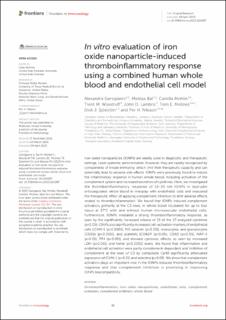In vitro evaluation of iron oxide nanoparticle-induced thromboinflammatory response using a combined human whole blood and endothelial cell model
Gerogianni, Alexandra; Bal, Melissa; Mohlin, Camilla; Woodruff, Trent M.; Lambris, John D.; Mollnes, Tom Eirik; Sjöström, Dick J.; Nilsson, Per
Peer reviewed, Journal article
Published version
Permanent lenke
https://hdl.handle.net/11250/3099625Utgivelsesdato
2023Metadata
Vis full innførselSamlinger
Sammendrag
Iron oxide nanoparticles (IONPs) are widely used in diagnostic and therapeutic settings. Upon systemic administration, however, they are rapidly recognized by components of innate immunity, which limit their therapeutic capacity and can potentially lead to adverse side effects. IONPs were previously found to induce the inflammatory response in human whole blood, including activation of the complement system and increased secretion of cytokines. Here, we investigated the thromboinflammatory response of 10-30 nm IONPs in lepirudin anticoagulated whole blood in interplay with endothelial cells and evaluated the therapeutic effect of applying complement inhibitors to limit adverse effects related to thromboinflammation. We found that IONPs induced complement activation, primarily at the C3-level, in whole blood incubated for up to four hours at 37°C with and without human microvascular endothelial cells. Furthermore, IONPs mediated a strong thromboinflammatory response, as seen by the significantly increased release of 21 of the 27 analyzed cytokines (p<0.05). IONPs also significantly increased cell-activation markers of endothelial cells [ICAM-1 (p<0.0001), P/E-selectin (p<0.05)], monocytes, and granulocytes [CD11b (p<0.001)], and platelets [CD62P (p<0.05), CD63 (p<0.05), NAP-2 (p<0.01), PF4 (p<0.05)], and showed cytotoxic effects, as seen by increased LDH (p<0.001) and heme (p<0.0001) levels. We found that inflammation and endothelial cell activation were partly complement-dependent and inhibition of complement at the level of C3 by compstatin Cp40 significantly attenuated expression of ICAM-1 (p<0.01) and selectins (p<0.05). We show that complement activation plays an important role in the IONPs-induced thromboinflammatory response and that complement inhibition is promising in improving IONPs biocompatibility.

